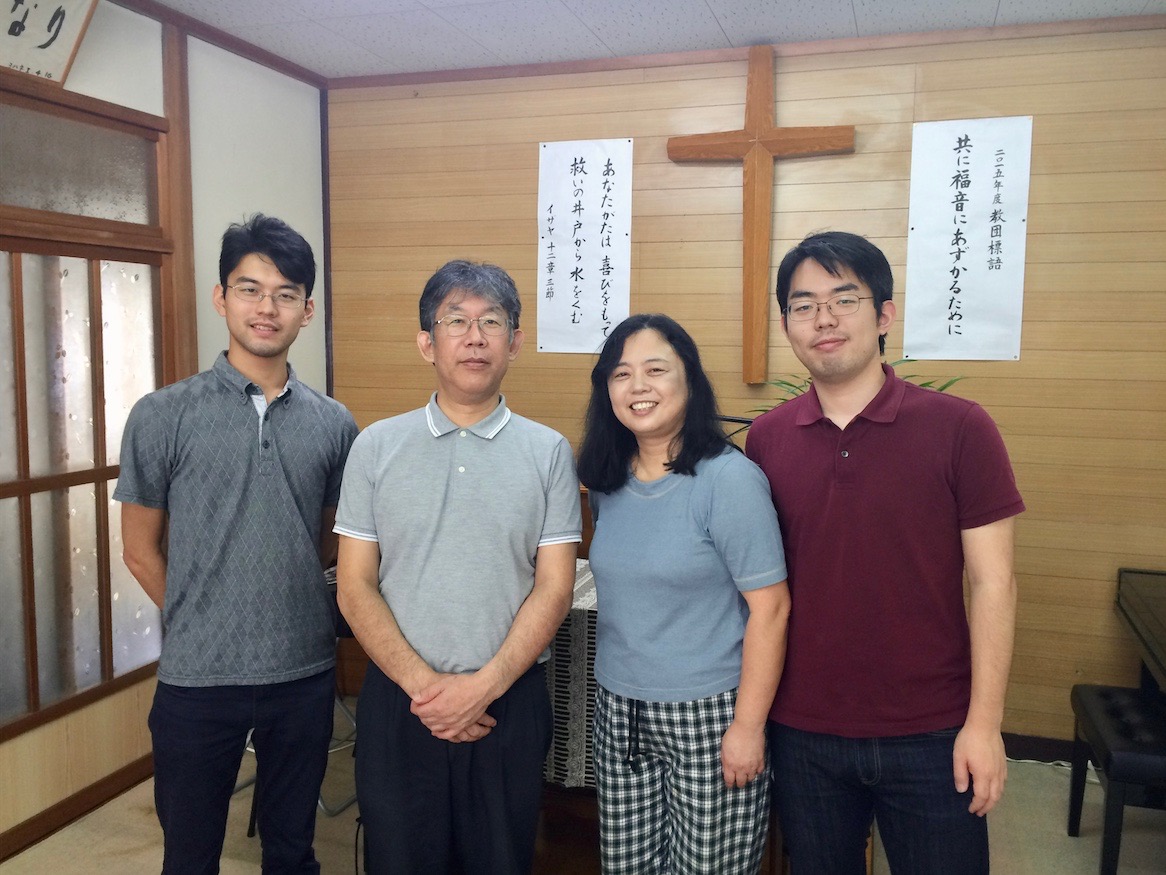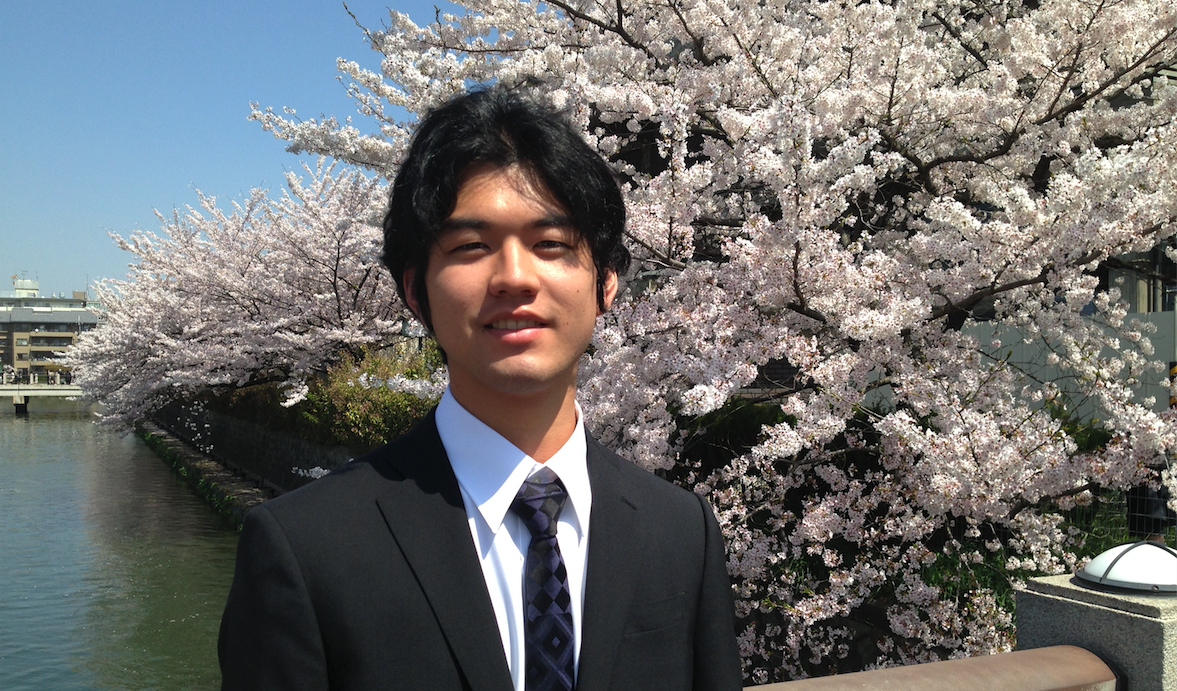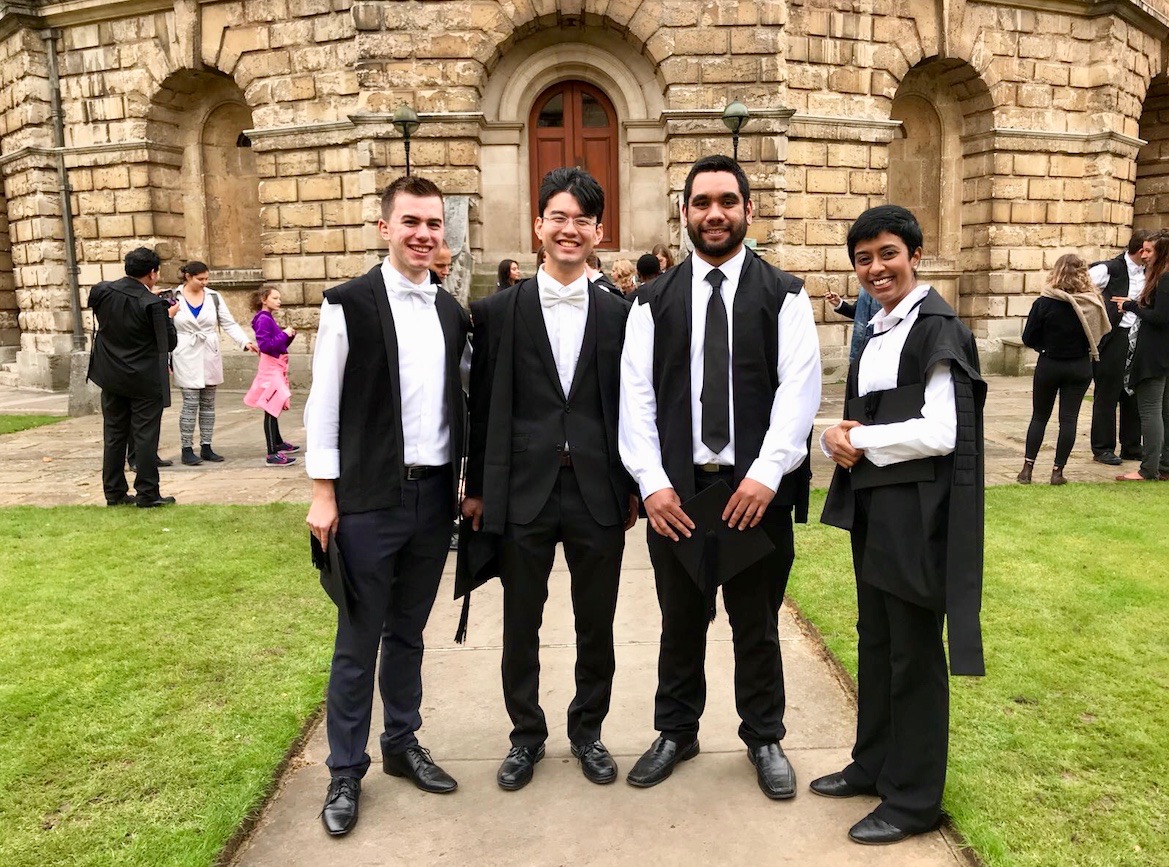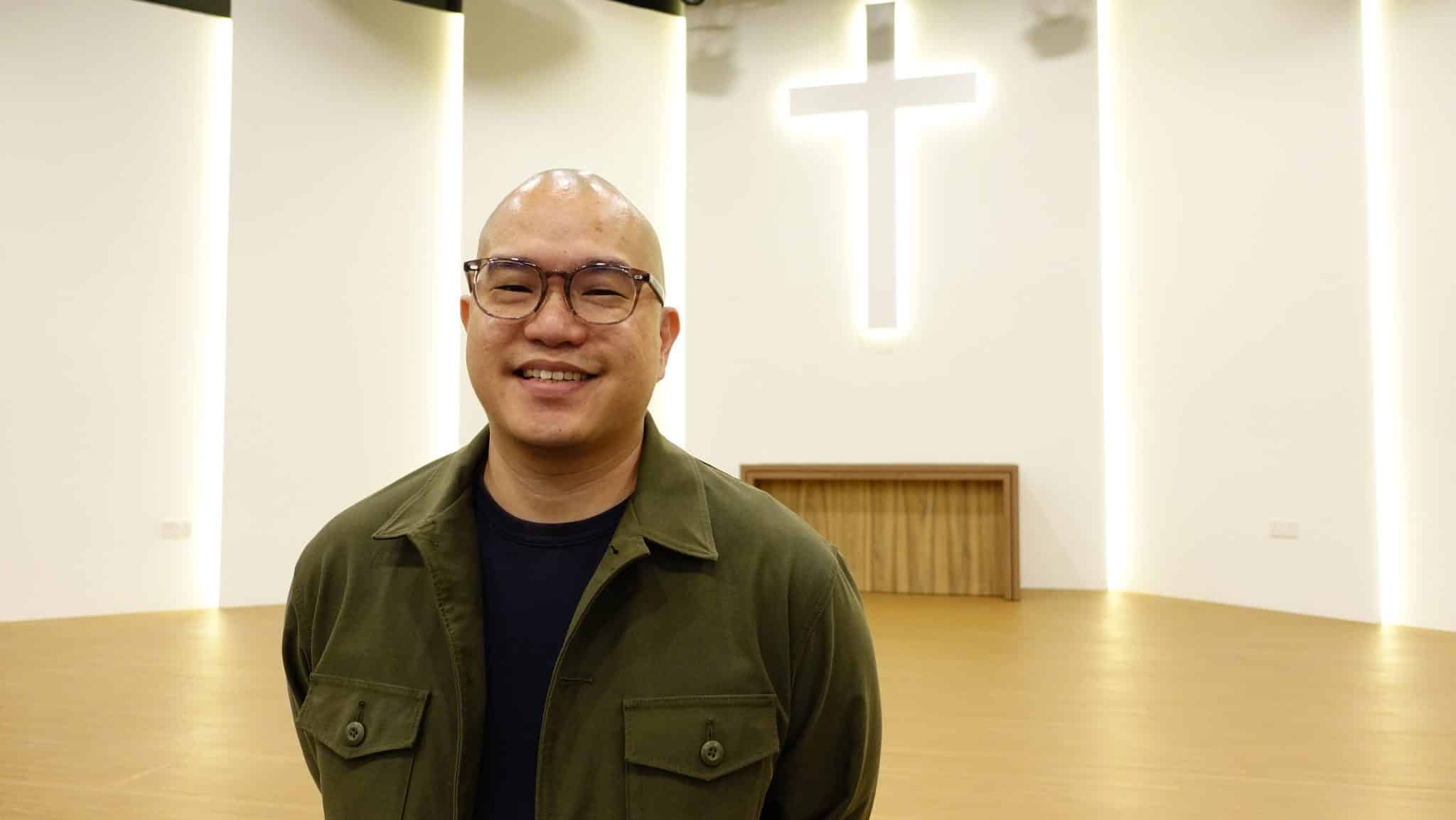“The tide is turning for youth in Japan”: RZIM apologetics fellow Yutaro Kato
Ng Jing Yng // May 23, 2019, 8:23 pm

Yutaro (extreme left) with his father, mother and older brother, Kentaro. Despite growing up in a family of pastors, it was not easy for Yutaro to identify as a Christian as a child – it is "isolating" to be different in Japan. All photos courtesy of Yutaro Kato.
In the 2003 award-winning movie, Lost in Translation, the two lead characters crossed paths several times under the neon bright lights and loud music along Tokyo’s busy streets.
But both of them, preoccupied with everyday troubles, were oblivious to their immediate surroundings and would later attest to a sense of loss they felt in life.
Yutaro Kato, a 25-year-old Japanese apologist currently based in Singapore, pointed to this similar search for a sense of identity among the Japanese people today.
For the Japanese, evidence might not always be the basis for decision-making. Instead, many are guided by the predominant culture.
The Oxford Centre for Christian Apologetics Fellow, who is serving under the Ravi Zacharias International Ministries (RZIM), said the most frequently asked questions were on topics such as identity, meaning of life and sexuality.
Said Kato: “In the Japanese society, traditional apologetics questions on science and evidence will still be asked, but at the same time, we have to address questions on issues of life.
“Today, universally, in the post-modernism age, people do not always have trust in evidence and they look for something else. The questions that we are usually asked are on identity, sexuality, fulfilment … those I think are the real issues,” he added.
The Kyoto native also elaborated that, for the Japanese, evidence might not always be the basis for decision-making. Instead, many people are guided by the predominant culture when making their decisions and forming conclusions.
For instance, during World War II, all evidence showed that the Japanese would not win the war even if they continued to fight.

“It is a crucial time for Japanese Christians to step up and be united to further spur the Christian faith in Japan,” says RZIM apologist Yutaro Kato, who observes that the youth in Japan are not as shackled as their predecessors to customs and traditions.
But, because there was strong public belief that victory was theirs, the Japanese leaders fought on for what was eventually a doomed outcome.
“Evidence is not the deciding factor,” said Kato. The number one rule in Japanese society is to “read and follow the atmosphere”, he added, and this means that it is critical to understand and act according to the predominant public sentiment.
Set apart
This rule applies when it comes to exploring religions and the Christian faith as well.
“It takes a lot for Japanese Christians to reveal that they are Christians.”
There is a still a palpable sense of wariness and scepticism when it comes to religion, due to terrorist attacks from fundamentalist cult groups in the 1990s, said Kato.
The Japanese culture, with its unique language and way of living, might also result in the Christian faith being seen as out of place, a foreign religion exclusive to the West.
Family plays an important role in the Japanese society, too, and Japanese Christians who have to abstain from traditional Buddhist rituals will then be seen as dishonouring the family, added Kato.
Therefore, being a Christian in Japan carries the risk of being isolated, as one is not acting according to prescribed norms and is behaving contrary to the majority.

“There is a responsibility to share the Gospel to this generation and to the next generation,” says Yutaro, who studied apologetics at Oxford University last year as a result of his conviction that it is time for the youth in Japan to come to Christ.
Despite growing up in a church and hailing from a lineage of pastors, Kato is no stranger to this fear of being isolated.
He recalled: “When I was seven or eight years old … I did not want my friends to see me going back home into a church building, so I would hide until they walked away.
“It takes a lot for Japanese Christians to reveal that they are Christians,” he added.
Search for meaning
For Kato himself, the first steps towards solidifying his faith came when he was working with youths who asked questions on evolution and about God’s orders to kill people in the Old Testament.
These questions soon became his own as well.
“I started to think that it doesn’t matter whether these (issues) were true or not … we just have to pretend that it’s true and everyone will be happy,” he said.
“There is a responsibility to share the Gospel to this generation and to the next generation.”
This burdened Kato, who was then in his early 20s, and he decided to take it upon himself to secure evidence on Christianity so that “it was not just wishful thinking”.
He looked into other faiths as well.
During his final year of university, when he was praying and seeking God on his future, he finally saw a clear path to Christian apologetics.
Kato, who was pursuing a degree in education administration, was highly concerned with the Japanese society and was thinking about joining the public service.
At around the same time, however, he chanced upon a video by Michael Ramsden, International Director of RZIM, on having the courage to share the Gospel.

Yutaro speaking at workplace seminars and schools to share the Christian faith. “I always have to remind myself that the whole point of my life is to be a good and faithful servant,” he says of his calling as an apologist.
Kato felt a tug in his heart that was later confirmed by his reading of Hebrews 11 and 12 to be a witness for God and to be faithful to one’s calling to be a witness.
“There were generations after generations who died to share the Gospel and eventually it was Jesus Christ himself who bled and died for the Gospel,” said Kato. “I realised that there is a responsibility to share the Gospel to this generation and to the next generation.”
The time is now
Kato believes that the tide is turning in Japan.
Young people who are less shackled by past memories of religious groups and terrorist attacks, are starting to open up to the Christian faith, with questions such as “Who am I?” weighing on their minds.
It is a crucial time for Japanese Christians to step up and be united to further spur the Christian faith in Japan, he added, pointing out that an ageing Japanese society also meant that the Japanese church is ageing.
Concurrently, there is a need for Japanese Christians to strengthen their knowledge of the Gospel so as to share and defend the faith to non-believers, he said.
Nevertheless, Kato noted that there is still a need for foreign missionaries in Japan.
“I don’t necessarily have to be the next Billy Graham, I just have to be faithful in fulfilling my calling.”
He acknowledged the difficulties faced by foreigners to share the Gospel due to the tightly-knit Japanese community and relatively exclusive Japanese culture.
But he added: “The foreign missionaries are not from the Japanese culture and are not bound to that culture … it is important to understand the culture but, at the same time, being from overseas allows them to overcome the culture and bondages that the Japanese people have.”
Kato encouraged further partnerships between Japanese Christians and Christians from other countries.
Citing Singapore as an example, he noted that Singaporeans sharing the Gospel in Japan would showcase that Christianity is not just a Western religion but applicable to people in Asia as well.
He also pointed out the strong discipleship practices in Singapore churches, adding that there could be learning exchanges between Singapore and Japan churches.
As for Kato, who has now spent four “hectic” months in Singapore, he remains thankful for all the opportunities given to him to speak in marketplace seminars and in schools.

“Singaporeans sharing the Gospel in Japan would show that Christianity is not just a Western religion, but applicable to people in Asia as well,” says Yutaro, who arrived in Singapore last December, and is now serving as a Fellow under the Ravi Zacharias International Ministries in Singapore.
Things do not always go as well as planned but he believes that all this training will prepare him for his eventual goal of sharing Christianity in Japan.
“I always have to remind myself that the whole point of my life is to be a good and faithful servant. I don’t necessarily have to be the next Billy Graham, I just have to be faithful in fulfilling my calling,” said Kato.
“It is such a privilege and joy to play a role in people’s lives as they become Christians, but that is not my ultimate sense of identity. My identity is that I am a son of God (and) that is something that keeps me going”.
We are an independent, non-profit organisation that relies on the generosity of our readers, such as yourself, to continue serving the kingdom. Every dollar donated goes directly back into our editorial coverage.
Would you consider partnering with us in our kingdom work by supporting us financially, either as a one-off donation, or a recurring pledge?
Support Salt&Light




